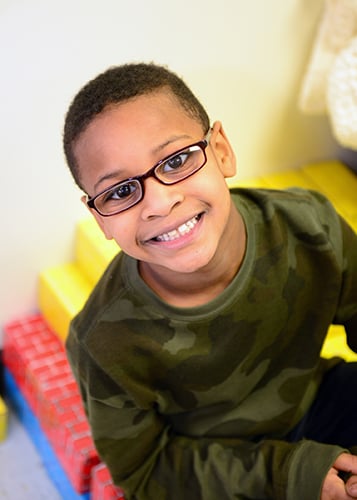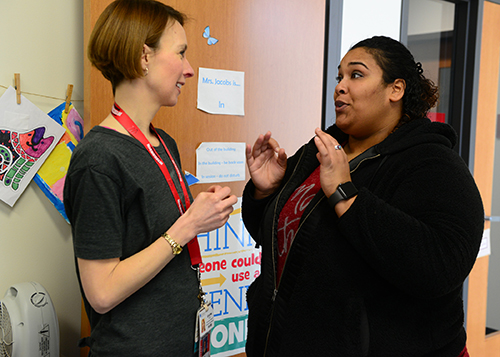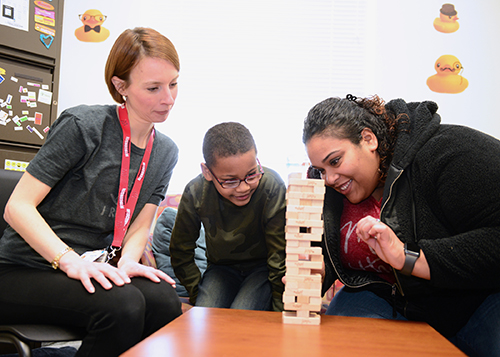
How school-based mental health helped Arvan become a superhero
It’s Arvan’s first frame at the bowling alley where friends and family are gathered to celebrate his 8th birthday. As his mom and classmates look on, he concentrates, then rolls the ball down the alley. Strike! He jumps up and explodes with excitement.
“I was like, YES!” said Arvan. “I was like a superhero!”
Arvan is a typical second grader –– he loves Pokémon, building with blocks, and going to school. But just nine months ago, Arvan’s mental health and behaviors were interfering with his learning, his friendships and his well-being. It got so bad, in fact, that his mom couldn’t imagine him having normal interactions with friends, let alone focus in school.
In first grade, Arvan often became highly emotional and upset in school, and was even showing signs of depression. Other kids were sometimes unkind to him, and he didn’t seem to know how to relate to peers. When he got frustrated, he would yell or cry, and even run out of the classroom. Then, things came to a head when, in the span of a few weeks, Arvan made some statements about hurting himself.
Those events led to an evaluation by the school social worker at Knapp Community School, who suggested that Arvan could benefit from in-school mental and behavioral health services provided by Children’s Wisconsin. The program, which began in 2015 through a partnership between Children’s Wisconsin, the Racine Collaborative for Children’s Mental Health, and the Racine Unified School District, aims to reduce barriers to care by providing mental and behavioral health services in school for kids and families.
Facing the stigma
 At first, Arvan’s mom, Leanna, was reluctant to sign on to services. “I told myself all the things,” she said. “No, not my son…he’s fine. I can fix this.” But as Arvan’s behaviors spiraled, Leanna’s perspective changed. “I’ve had enough,” she remembered thinking. “I need to find out how I can help my son.”
At first, Arvan’s mom, Leanna, was reluctant to sign on to services. “I told myself all the things,” she said. “No, not my son…he’s fine. I can fix this.” But as Arvan’s behaviors spiraled, Leanna’s perspective changed. “I’ve had enough,” she remembered thinking. “I need to find out how I can help my son.”
According to Knapp principal Rich Wytonick, parents at Knapp are becoming increasingly open to using mental and behavioral health services offered at the school. “In the first year, more parents were skeptical,” he said. “There is a lot of stigma in our culture and in our community around getting counseling. But now, as our school culture has changed, and we’ve built relationships with parents, there’s a lot of trust and even enthusiasm. Relationships go a very long way to making kids and families feel safe, secure and happy.”
Kristine Jacobs, LCSW, has been the Children’s Wisconsin child and family therapist at Knapp School since the program’s inception, and has helped nurture the relationships that Wytonick talks about. From her sunny office with view onto the Knapp school playground, she works full-time providing one-on-one counseling with kids and parents, as well as working directly with school staff. She consults with teachers to help them support kids with challenges, provides regular training to school staff on issues of trauma-based care, and presents to parents on topics like behavioral support and building positive interactions.
“The work has been so successful that we’re seeing fewer behavioral issues as the years have progressed,” said Wytonick. “A couple of years ago, I wouldn’t have been able to stand here and talk about this, because I’d be called to classrooms multiple times a day to deal with behavior problems. Our whole school culture has changed.”
Kristine agrees. “This year, although I’m still seeing plenty of kids and families, there is less of a demand. I credit the work the teachers, parents and the whole school community is doing to better support kids emotionally and socially.” Although she won’t be working her way out of a job in the immediate future, Kristine has witnessed how integrating mental and behavioral health seamlessly into the school setting has made a tremendous difference.
One of the best measures of school health is staff turnover, and in four years, Knapp Community School has gone from having 45 percent staff turnover rate every two years, to a 95 percent staff retention rate. “Staff are coming to Knapp and staying at Knapp, which is very, very good for kids,” said Wytonick. There’s no doubt that all the work we’ve done with the support of Children’s Wisconsin has played a huge part in helping build our school culture and our outcomes.
Partnering with parents
 Kristine understands how kids communicate through their behaviors. “When kids like Arvan tell us they want to hurt themselves, they are telling us that they’re hurting,” she said. “My job is to help kids find healthier ways to express those feelings.”
Kristine understands how kids communicate through their behaviors. “When kids like Arvan tell us they want to hurt themselves, they are telling us that they’re hurting,” she said. “My job is to help kids find healthier ways to express those feelings.”
As she started working with Arvan’s family, Kristine found a supportive partner in Leanna. At first, her sessions with mom were even more frequent than those with Arvan himself. “Leanna is such an involved parent,” she said. “It’s one thing for me to help Arvan at school, but if I can help support mom with skills for home, it’s going to go even farther and help the whole family.”
Leanna and Arvan began weekly therapy with Kristine over the summer, which gave them lots of time to practice their new skills. Leanna began seeing changes right away.
One of the things we do is if Arvan wants my attention and I’m busy, instead of interrupting or getting upset, he just comes over to me and holds my hand. That way he’s showing me he wants my attention in a positive way,” she said.
Kristine has seen huge changes in the relationship between mom and son, and how it impacts Arvan’s two younger siblings as well. “Leanna is paying so much attention, tuning into her kids, and modeling positive behavior skills. She’s taking time to have positive interactions with them, and is shows in Arvan’s mood and ability to learn. He’s just happier.”
When you ask Arvan what he’s gotten out of his work with Kristine, he doesn’t miss a beat. “I learned how to stay calm,” he said, “I breathe.” He closes his eyes and demonstrates a long inhale and exhale. Then he opens his eyes and keeps on building a tower of blocks.
With Kristine and his mom’s help, Arvan is also building his emotional vocabulary. “Kids need a substitute langue,” Kristine said. “Instead of ‘I don’t want to be here anymore’ we can teach kids to say ‘I am angry, sad or frustrated.’”
Bringing care to the neighborhood
 By the end of summer, Arvan had made great progress and was ready to start second grade.
By the end of summer, Arvan had made great progress and was ready to start second grade.
“In first grade, there were meltdowns every day,” said mom. “Now, there are hardly any.”
As a busy, working mom of three who also volunteers as a co-facilitator of a community organization at Knapp School, Leanna can’t imagine how she would have possibly taken the time off to get Arvan to therapy outside of school. “Plus, there are long waiting lists to get in to see a therapist,” she said.
She appreciates that Children’s Wisconsin helped bring services to the school. “You brought it TO us,” she emphasized. “You brought Kristine TO us.” She says that having another adult to talk to and help her to support her son is priceless.
“This program has helped him get back to being himself and showing that to everyone around him,” said Leanna. “I just want the world to know how sweet and wonderful this child is.”
Children's Wisconsin Resources

Written by
Katie Lott
Writer
Related Stories
No related articles found.



